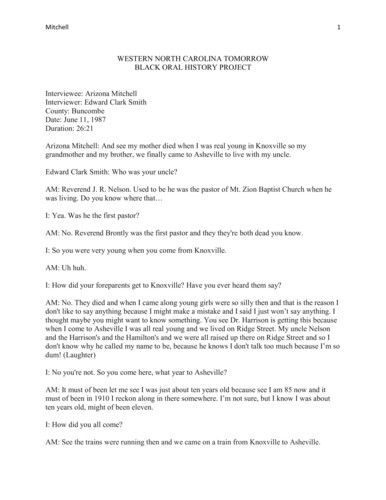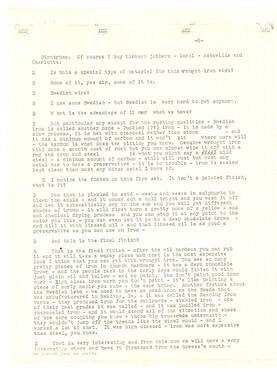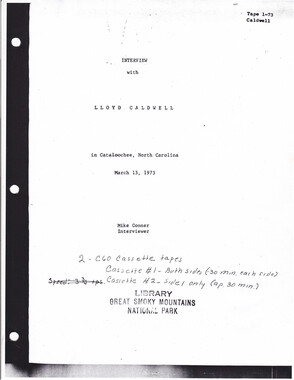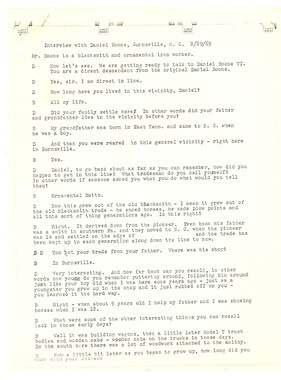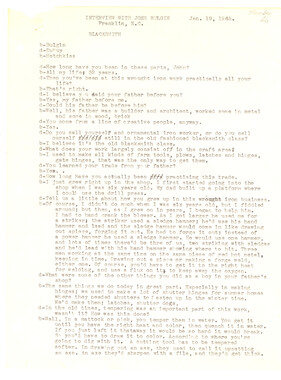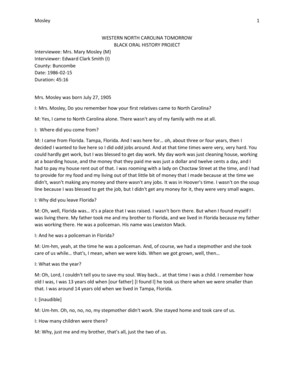Western Carolina University (20)
View all
- Canton Champion Fibre Company (2308)
- Cherokee Traditions (293)
- Civil War in Southern Appalachia (165)
- Craft Revival (1942)
- Great Smoky Mountains - A Park for America (2767)
- Highlights from Western Carolina University (430)
- Horace Kephart (941)
- Journeys Through Jackson (154)
- LGBTQIA+ Archive of Jackson County (24)
- Oral Histories of Western North Carolina (314)
- Picturing Appalachia (6772)
- Stories of Mountain Folk (413)
- Travel Western North Carolina (160)
- Western Carolina University Fine Art Museum Vitreograph Collection (129)
- Western Carolina University Herbarium (92)
- Western Carolina University: Making Memories (708)
- Western Carolina University Publications (2283)
- Western Carolina University Restricted Electronic Theses and Dissertations (146)
- Western North Carolina Regional Maps (71)
- World War II in Southern Appalachia (131)
University of North Carolina Asheville (6)
View all
- 1700s (1)
- 1860s (1)
- 1890s (1)
- 1900s (2)
- 1920s (2)
- 1930s (5)
- 1940s (12)
- 1950s (19)
- 1960s (35)
- 1970s (31)
- 1980s (16)
- 1990s (10)
- 2000s (20)
- 2010s (24)
- 2020s (4)
- 1600s (0)
- 1800s (0)
- 1810s (0)
- 1820s (0)
- 1830s (0)
- 1840s (0)
- 1850s (0)
- 1870s (0)
- 1880s (0)
- 1910s (0)
- Appalachian Region, Southern (15)
- Asheville (N.C.) (11)
- Avery County (N.C.) (1)
- Buncombe County (N.C.) (55)
- Cherokee County (N.C.) (17)
- Clay County (N.C.) (2)
- Graham County (N.C.) (15)
- Great Smoky Mountains National Park (N.C. and Tenn.) (1)
- Haywood County (N.C.) (40)
- Henderson County (N.C.) (5)
- Jackson County (N.C.) (131)
- Knox County (Tenn.) (1)
- Macon County (N.C.) (17)
- Madison County (N.C.) (4)
- McDowell County (N.C.) (1)
- Mitchell County (N.C.) (5)
- Polk County (N.C.) (3)
- Qualla Boundary (6)
- Rutherford County (N.C.) (1)
- Swain County (N.C.) (30)
- Watauga County (N.C.) (2)
- Waynesville (N.C.) (1)
- Yancey County (N.C.) (3)
- Blount County (Tenn.) (0)
- Knoxville (Tenn.) (0)
- Lake Santeetlah (N.C.) (0)
- Transylvania County (N.C.) (0)
- Interviews (314)
- Manuscripts (documents) (3)
- Personal Narratives (7)
- Photographs (4)
- Sound Recordings (308)
- Transcripts (216)
- Aerial Photographs (0)
- Aerial Views (0)
- Albums (books) (0)
- Articles (0)
- Artifacts (object Genre) (0)
- Biography (general Genre) (0)
- Cards (information Artifacts) (0)
- Clippings (information Artifacts) (0)
- Crafts (art Genres) (0)
- Depictions (visual Works) (0)
- Design Drawings (0)
- Drawings (visual Works) (0)
- Envelopes (0)
- Facsimiles (reproductions) (0)
- Fiction (general Genre) (0)
- Financial Records (0)
- Fliers (printed Matter) (0)
- Glass Plate Negatives (0)
- Guidebooks (0)
- Internegatives (0)
- Land Surveys (0)
- Letters (correspondence) (0)
- Maps (documents) (0)
- Memorandums (0)
- Minutes (administrative Records) (0)
- Negatives (photographs) (0)
- Newsletters (0)
- Newspapers (0)
- Occupation Currency (0)
- Paintings (visual Works) (0)
- Pen And Ink Drawings (0)
- Periodicals (0)
- Plans (maps) (0)
- Poetry (0)
- Portraits (0)
- Postcards (0)
- Programs (documents) (0)
- Publications (documents) (0)
- Questionnaires (0)
- Scrapbooks (0)
- Sheet Music (0)
- Slides (photographs) (0)
- Specimens (0)
- Speeches (documents) (0)
- Text Messages (0)
- Tintypes (photographs) (0)
- Video Recordings (physical Artifacts) (0)
- Vitreographs (0)
- WCU Mountain Heritage Center Oral Histories (25)
- WCU Oral History Collection - Mountain People, Mountain Lives (71)
- Western North Carolina Tomorrow Black Oral History Project (69)
- A.L. Ensley Collection (0)
- Appalachian Industrial School Records (0)
- Appalachian National Park Association Records (0)
- Axley-Meroney Collection (0)
- Bayard Wootten Photograph Collection (0)
- Bethel Rural Community Organization Collection (0)
- Blumer Collection (0)
- C.W. Slagle Collection (0)
- Canton Area Historical Museum (0)
- Carlos C. Campbell Collection (0)
- Cataloochee History Project (0)
- Cherokee Studies Collection (0)
- Daisy Dame Photograph Album (0)
- Daniel Boone VI Collection (0)
- Doris Ulmann Photograph Collection (0)
- Elizabeth H. Lasley Collection (0)
- Elizabeth Woolworth Szold Fleharty Collection (0)
- Frank Fry Collection (0)
- George Masa Collection (0)
- Gideon Laney Collection (0)
- Hazel Scarborough Collection (0)
- Hiram C. Wilburn Papers (0)
- Historic Photographs Collection (0)
- Horace Kephart Collection (0)
- Humbard Collection (0)
- Hunter and Weaver Families Collection (0)
- I. D. Blumenthal Collection (0)
- Isadora Williams Collection (0)
- Jesse Bryson Stalcup Collection (0)
- Jim Thompson Collection (0)
- John B. Battle Collection (0)
- John C. Campbell Folk School Records (0)
- John Parris Collection (0)
- Judaculla Rock project (0)
- Kelly Bennett Collection (0)
- Love Family Papers (0)
- Major Wiley Parris Civil War Letters (0)
- Map Collection (0)
- McFee-Misemer Civil War Letters (0)
- Mountain Heritage Center Collection (0)
- Norburn - Robertson - Thomson Families Collection (0)
- Pauline Hood Collection (0)
- Pre-Guild Collection (0)
- Qualla Arts and Crafts Mutual Collection (0)
- R.A. Romanes Collection (0)
- Rosser H. Taylor Collection (0)
- Samuel Robert Owens Collection (0)
- Sara Madison Collection (0)
- Sherrill Studio Photo Collection (0)
- Smoky Mountains Hiking Club Collection (0)
- Stories of Mountain Folk - Radio Programs (0)
- The Reporter, Western Carolina University (0)
- Venoy and Elizabeth Reed Collection (0)
- WCU Gender and Sexuality Oral History Project (0)
- WCU Students Newspapers Collection (0)
- William Williams Stringfield Collection (0)
- Zebulon Weaver Collection (0)
- African Americans (97)
- Artisans (5)
- Cherokee pottery (1)
- Cherokee women (1)
- College student newspapers and periodicals (4)
- Education (3)
- Floods (13)
- Folk music (3)
- Great Smoky Mountains National Park (N.C. and Tenn.) (1)
- Hunting (1)
- Mines and mineral resources (2)
- Rural electrification -- North Carolina, Western (2)
- School integration -- Southern States (2)
- Segregation -- North Carolina, Western (5)
- Slavery (5)
- Sports (2)
- Storytelling (3)
- World War, 1939-1945 (3)
- Appalachian Trail (0)
- Cherokee art (0)
- Cherokee artists -- North Carolina (0)
- Cherokee language (0)
- Church buildings (0)
- Civilian Conservation Corps (U.S.) (0)
- Dams (0)
- Dance (0)
- Forced removal, 1813-1903 (0)
- Forest conservation (0)
- Forests and forestry (0)
- Gender nonconformity (0)
- Landscape photography (0)
- Logging (0)
- Maps (0)
- North Carolina -- Maps (0)
- Paper industry (0)
- Postcards (0)
- Pottery (0)
- Railroad trains (0)
- Waterfalls -- Great Smoky Mountains (N.C. and Tenn.) (0)
- Weaving -- Appalachian Region, Southern (0)
- Wood-carving -- Appalachian Region, Southern (0)
- Sound (308)
- StillImage (4)
- Text (219)
- MovingImage (0)
Interview with Arizona Mitchell
Item
Item’s are ‘child’ level descriptions to ‘parent’ objects, (e.g. one page of a whole book).
-
-
Mitchell 1 WESTERN NORTH CAROLINA TOMORROW BLACK ORAL HISTORY PROJECT Interviewee: Arizona Mitchell Interviewer: Edward Clark Smith County: Buncombe Date: June 11, 1987 Duration: 26:21 Arizona Mitchell: And see my mother died when I was real young in Knoxville so my grandmother and my brother, we finally came to Asheville to live with my uncle. Edward Clark Smith: Who was your uncle? AM: Reverend J. R. Nelson. Used to be he was the pastor of Mt. Zion Baptist Church when he was living. Do you know where that… I: Yea. Was he the first pastor? AM: No. Reverend Brontly was the first pastor and they they're both dead you know. I: So you were very young when you come from Knoxville. AM: Uh huh. I: How did your foreparents get to Knoxville? Have you ever heard them say? AM: No. They died and when I came along young girls were so silly then and that is the reason I don't like to say anything because I might make a mistake and I said I just won’t say anything. I thought maybe you might want to know something. You see Dr. Harrison is getting this because when I come to Asheville I was all real young and we lived on Ridge Street. My uncle Nelson and the Harrison's and the Hamilton's and we were all raised up there on Ridge Street and so I don't know why he called my name to be, because he knows I don't talk too much because I’m so dum! (Laughter) I: No you're not. So you come here, what year to Asheville? AM: It must of been let me see I was just about ten years old because see I am 85 now and it must of been in 1910 I reckon along in there somewhere. I’m not sure, but I know I was about ten years old, might of been eleven. I: How did you all come? AM: See the trains were running then and we came on a train from Knoxville to Asheville. Mitchell 2 I: How long did it take? AM: I can’t remember. It didn’t take so long, I guess about four hours or more. See Knoxville isn’t too far from here. I: Did you all came alone? AM: My grandmother was along and her name was Chanie [Wenton] and my Brother’s name was John Wiley and we come to Asheville when I was young after my mother died in Knoxville, Tennessee. I just can’t really remember a lot, I’ve been through a lot of trouble back yonder way, you know. My memory is just bad. Now I enjoyed now what this woman was saying. I: What was Asheville like? AM: I can't remember, I don't know whether I can tell you or not. I do remember how we used to have street cars running then. You had to sit in the back you know. Couldn't sit in the front. Just certain places you couldn‘t go that… I: Did you go to school when you first got here? AM: Yea. I: What was the first school you went to? AM: Ah, I went to what was called Catholic Hill then. Stevens Lee and it’s French Broad now. Catholic Hill School used to be off of Grail Street. You know as you came of off Ridge Street down Grail at Catholic Avenue. That was Steve Lee but it used to Catholic Hill, that was the I1aile of the school when I went to school. But you see, they had a fire over were Dr. Walker’s place used to be, I mean no catholic Hill cause Benton Harris 1 daughter and several little children got burned in the fire you know. Professor Lee was, he was the principal then. Walter Lee, I guess you remember his son, I reckon, his son might be older than you. I think he is dead now though. His daughter Rita is still living. I: Yea. I know Rita. AM: Who is that she works for? She's married to the [Ray] boy now. I think she was Clark's secretary. She used to be, I don't know now. I'm sorry I ain't got nothing to… I: What was that like? AM: Well, you know we didn't know much but going to church and to school. Wasn't so much activities for young girls. Our family wouldn't let us go to everything. You know some girls had to go to dances and all that kind of stuff, but we weren't allowed to do much. Really, I just don't know nothing. Mitchell 3 I: Is this church any different now than it was then, does it still follow the same customs or is there any difference in the old and new church? AM: Well, might be a little different. But, not much, cause I don't think there has been too much difference they usually follow the same rules. Of course when Reverend Harrison came, when he came in, while he was there paid the debt off the church. See my uncle built the church, but when he died it wasn't finished paying for. He came in and paid the debt and then he changed the church around. I guess Ms. Boulder told you that cause she belonged to the Episcopal church until she married Reverend Harrison. Our main door was facing the little street that goes along by the church, let me see what is the name of that street. Can’t think of it. They used to call it Eagle Terrace around in there. You know where Mtn. Zion is? I: Uh huh. AM: He just changed it around some. We had three opening doors on Eagle Terrace, but he closed one in and just had two. We just kind of changed it around. We, ah after the white First Baptist built their church over on College Street they had premised my uncle before he died that we could get this organ and the pews and our church got them. Ever since we've had that organ the white First Baptist was wanting it back, but they never got it. It was a wonderful pipe organ, so that was promised to my uncle before he died so after they changed the church around then Reverend Harrison was able to get the things that Reverend Chapman was pastor of First Baptist and it was up there on College Street. Afterwards they built on Charlotte Street we got their old pews and after we got new pews, then Reverend White let Reverend Grant have our old pews. But, I just can’t… I: Now you were Reverend Nelson's… AM: I was his niece. I: Now, the church was built when he was a minister, had already been erected then, right? AM: No, when he first come to Asheville, a little young preacher. From what I can hear the old folks say that he had built three churches I believe. They started on Patton Avenue or somewhere. Anyway, when I come to Asheville, the [Pepperlash] Church down below us was still there then the congregation got so big that he built the church where we are now. They tore down that old church, you know a few years back cause it was just so old you know. As the congregation grew bigger, he decided to build a bigger church. There's a little bird in your car, I just seen him fly. So they gave him credit for building three churches, but I just remember the first church we had the [Pepperlash] church we had down below were we are now, but they made that a parking lot. I: I remember it turned into several churches there. It was a movie theatre once too. AM: Yea. I'm trying to think, it was kind of holynist people I believe bought it the first time, then they sold it and the theatre took it over or something like that. I can't remember. Was you a little boy then? Mitchell 4 I: Uh huh. AM: You was? How many brothers and sisters do you have? I: I have a brother and four sisters. AM: Oh you do? I never did remember how many children your mother had. Somebody asked me one time, ''Where did you get that name from?" I said I don't know, unless my mother got it from the state of Arizona. I don't know how she named me, cause she died when I was young. They often wonder where I got my name from. I: Do you remember the Reverend Harrison? AM: Oh yea. I've been there since I've joined the church when I was about 14 years old. I said I guess I'll stay there until I die, you know. For the sake of my uncle, I will still stay on there you know. I don't know the family, I know her face cause I've been in a group with her some. I: What did your grandmother do for a living? AM: Working in service like cooking. I: How old was you when you first went to work? AM: I'm going to tell you, I had to sometimes get up some mornings before I went to school and work in my grandmother's place so she could rest a little and then cane on the job later and was working on Biltmore Avenue I believe I have worked about all my life. Working making five dollars a week. Had to pay street car fare. I worked for Dr. Creechit, after I had been married me and my husband went together. Until Ms. Pegram got sick, I worked. She asked me to come stay with her and she of [interruption]. Of course my first husband I married a Smith and I had one son and then after we separated, he walked off and left me with a young baby then when my son was about seven years old, I married a fellow named James Mitchel, and he died in 1949. So somebody said my don't you marry again, why don't you court? I said don't talk to me about no more of that. I said I want to get to heaven and I have just been… I: I asked you a minute ago about churches, are the services now different? AM: Well you now, there's a difference in the preachers. Reverend Harrison was a good preacher. Of course, Reverend White is a good preacher. My uncle was a preacher who like to sing and get folks shouting and so on. We don't have too many doing that nowadays. But, I said what was that song our church sung, Raffle Brown and how he sung that song set the old folks on fire. But, I’ll tell you, see pastors get salaries now, but when my uncle came along you now, of course we were building a church, and paying on it, he would go along with a can up on Eagle Street, like a cup and whenever the folks would have the rally on maybe the forth Sunday or Mitchell 5 something like that. Whenever the members turned it, he would turn his money in in that cup. He worked, but see nowadays preachers have a salary, but he just had two Sundays out of a month and the salary would go to him, and the other Sundays the money went to pay on the church. That's the way I remember it. I: Reverend Nelson came from Tennessee, right? Now did you come with him. AM: Uh huh. I: Did you come with him? AM: No. That little Pepperlash church was built when I come to Asheville. I: You came? AM: No I didn't come here with him, cause we lived in Knoxville, Tennessee and we used to come and my grandmother would bring me up every summer and visit. He had a daughter and we ran about the same age. You see the picture of her there? I: Uh huh. AM: She died here about not been too long, about two years ago. She was living in Cleveland. We used to go and do volunteer work at Oteen and of course when we went I just worked and helped in the nursery, you know. Cause people bring the little children and didn't let them go in the hospital cause used to have to be patients, you know. I: So you kept… AM: Two or three of us would go out on Sunday and keep the children while the mothers visit their husbands, you know. I: How long did you do that? AM: Oh lord, I can't remember that, it was way back. Let me see, was that, I think it was along in the 40's somewhere when I done that. I: Did you keep black and white kids? AM: Oh yea. Took care of them all at that time. This was the American Legion auxiliary. Different women would go different Sundays. I: Do you think things are any better now than when you were growing up? AM: Well, in some ways it is. This old Klu Klux Klan trying to get back in here again, but these young folks are not going to take that like we young folks did. I'll tell you maybe we are having a better time making a little more money and all. Mitchell 6 I: What was the least money you ever worked for? AM: Five dollars a week for eight o'clock in the morning to five o'clock at night. Then had to pay street car fare. I: Where did you work? AM: Out in Grove Park section. For Doctor [Pritchett]. Just set that anywhere. I worked for Doctor Antons and Dr. Hensley. I: What kind of work did you do? AM: Maid work and cook. I: Did you take care of his children too? AM: Yea. When I worked for Doctor Pritchett, they had a little boy and I had to tend to him. They had a cook and a nurse, but I just cleaned up and took care of the little boy. After the boy got good size and didn't need a nurse, the cook had to go home she died and I just started the cooking. That's all I have ever done, is labor hard work. Then I worked at Mission Hospital when it used to be over on Oak Street. Now this McGinnis woman when my baby was young and I had to go to work, this Ms. McGinnis quit her job and gave me her job at the Memorial Mission Hospital and I worked in the kitchen and she gave up her job so I could have a job. That family has always kind of helped me along. They still, the girl is still living, the oldest girl. Every year she send for me to come to Washington. She pays my fare and everything. I stay as long as I want to. She wrote the other week and said think about coming, I am going to get your fare together. I wrote a letter and told her I didn't know when I could get there cause last year my great grandchildren come you know for the month. I usually try to go on the 21st of June since it is her birthday. I: Her mother quit her job so you could have it? AM: Uh huh. My baby, my son… I: What was it like working for white people? Was it hard, how were you treated? AM: I was treated nice. They had an old superintendent over the hospital. Yea. She got mad about something and called us you darkies this, and you darkies that. I just walked off the job. I needed the job, but I just walked off. About five or six quit and they had to get somebody else. I: You had a tough time? A child and all by yourself. AM: Yea. I sure did. I made it. Just trusted in the lord. People were so nice to me. My daughter-in-law has a friend who lives in Winston Salem she sent me two dresses or some change. I get a little pension you know, but I try to be nice to everybody. Whatever I can do, I do. You know. Mitchell 7 I: Did you live by yourself, you and your child? AM: No, I lived with Mrs. Pegram, Ms. McGinnis' sister on Ridge Street and she's the one who got sick. She said Arizona if you stay home and quit work and take care of ne I will help you and I quit and stayed with her sick eight years. She had a stroke and I tended to her. She was just as good to me as could be and I just quit working and had married again then, but before that time seven years I had to look after me and my child myself. She took my child over and raised him and give me a change to go. I've been through the ringer but I am still here. I'm just thankful to the lord and then after my son got grown and he married Lucille Hall they lived on Blanton Street here. She is in her fifties somewhere. Her sister was Marie, she lived in Buffalo but…
Object
Object’s are ‘parent’ level descriptions to ‘children’ items, (e.g. a book with pages).
-
Arizona Mitchell is interviewed by Edward Clark Smith on July 16, 1987 as a part of the Western North Carolina Tomorrow Black Oral History Project. Born in 1901, Mitchell moved from Knoxville to Asheville in 1910 after her mom died. She talks about churches and working for white people cooking, cleaning, and raising children. When her son was a baby her first husband left her and Mrs. McGinnis quit her job at Memorial Mission so Mitchell could have it. She remained in touch with the family her entire life.
-
